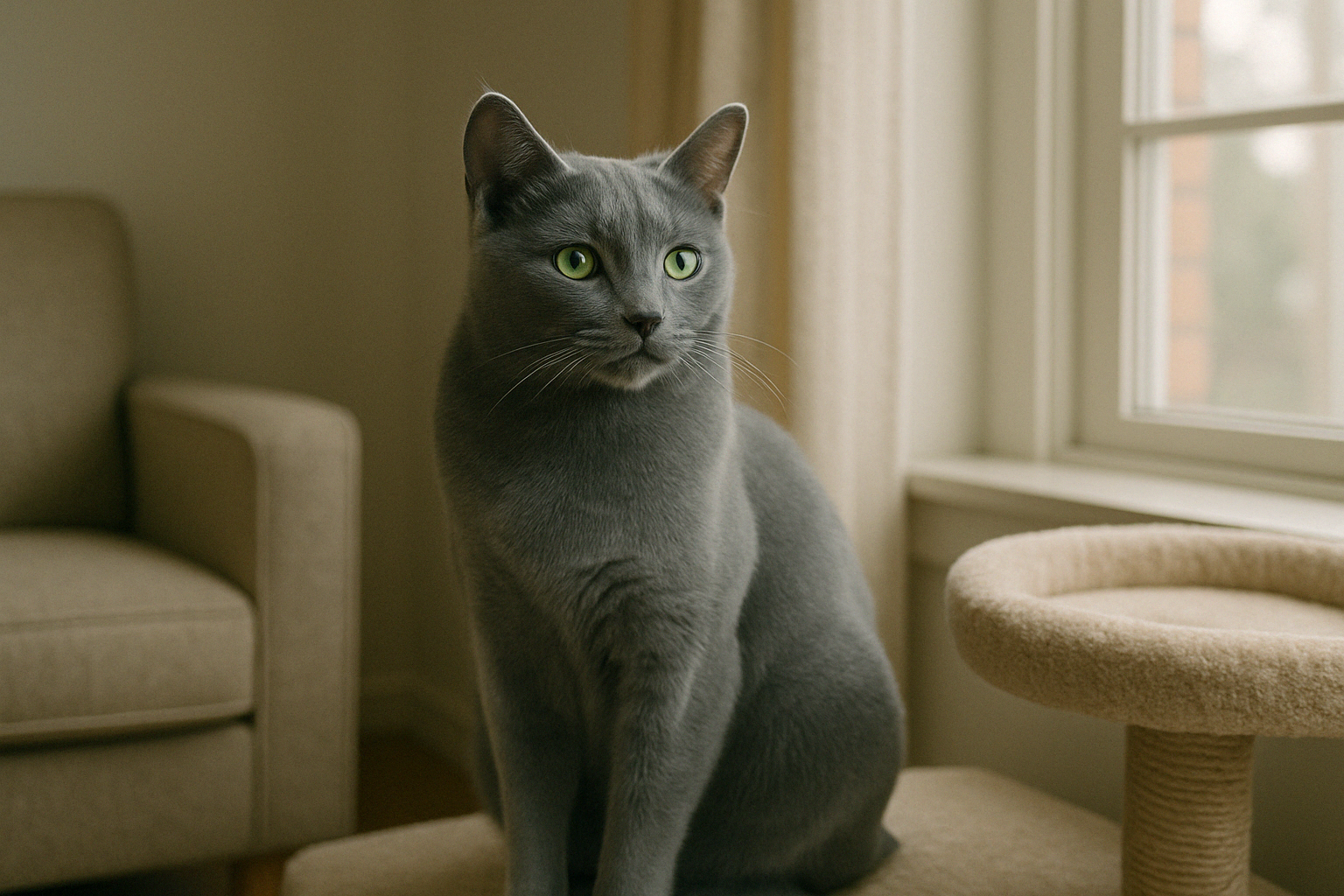The Russian Blue is a cat that combines elegance, intelligence, and a naturally regal presence. With their shimmering silver-blue coat, emerald green eyes, and quiet personality, they make for a dignified yet deeply affectionate companion.
Though not as outgoing as some breeds, Russian Blues form strong bonds with their families and thrive in peaceful, structured environments. In this guide, you’ll learn everything you need to know to raise and care for a happy, healthy Russian Blue.
The Personality of the Russian Blue
Russian Blues are known for:
- Quiet, reserved demeanor
- Strong loyalty to their humans
- Shyness around strangers
- Playful behavior in private or trusted company
- Intelligence and curiosity
They’re often described as “gentle introverts” — affectionate, but not needy; playful, but not hyper.
Physical Characteristics
The Russian Blue is a visually striking breed, featuring:
- A short, dense, double-layered coat with a bluish-silver shimmer
- Vivid green eyes that develop by age 4–6 months
- A lean, muscular body
- Delicate bone structure with long limbs
- A wedge-shaped head and upright ears
Their plush coat stands away from the body and feels soft, similar to velvet.
Grooming and Coat Care
One of the easiest cats to maintain in terms of grooming, the Russian Blue:
- Requires brushing just once a week to remove dead hair
- Rarely mats or tangles
- Keeps very clean on their own
- Sheds moderately, more during seasonal changes
Routine grooming helps strengthen your bond and keeps their coat shining. Occasional baths are usually not necessary.
Feeding and Nutrition
The Russian Blue has a tendency to gain weight if overfed — partly because of their quiet nature and love of routine.
Feeding tips:
- Choose high-protein, balanced food
- Feed measured portions twice a day
- Avoid excessive treats
- Use slow-feeders or puzzle bowls for enrichment
- Monitor weight regularly — their thick coats can hide extra pounds
Ask your vet for guidance on calories based on age and activity level.
Behavior and Socialization
Russian Blues are affectionate with their families, but cautious with new people.
To help them thrive:
- Give them time to warm up to guests
- Let them initiate contact
- Avoid loud environments or sudden changes
- Provide plenty of safe spots to retreat (cat trees, cozy beds, quiet rooms)
They do best in calm households where they can feel safe and in control of their environment.
Play and Mental Stimulation
Though quiet, Russian Blues are playful and intelligent. They enjoy:
- Feather toys, balls, and teaser wands
- Puzzle toys and food games
- Interactive play with trusted humans
- Climbing shelves or cat trees
- Observing the world from windows or perches
Playtime is essential for bonding — even just 15–20 minutes a day.
Living Environment
Ideal homes for a Russian Blue include:
- Quiet and structured routines
- Indoor-only access (to protect their coat and avoid stress)
- Multiple cozy, clean sleeping spots
- Vertical space for climbing and observing
- Minimal chaos or frequent guest turnover
They are perfect for apartments, studios, or homes with a consistent atmosphere.
Russian Blues and Other Pets
With proper introductions, Russian Blues can get along with:
- Other cats (especially other calm breeds)
- Gentle dogs
- Respectful children
They dislike rough handling and loud noises, so any multi-pet or family setting should be gentle and predictable.
Health Considerations
Russian Blues are a generally healthy breed, but monitor for:
- Obesity, especially as they age
- Bladder stones (occasionally seen)
- Dental disease, like in most cats
- Separation anxiety in overly isolated cats
Maintain:
- Yearly veterinary checkups
- Good oral hygiene
- Regular play and interaction
- Consistent feeding and grooming schedules
With proper care, Russian Blues often live 15–20 years or more.
Final Thoughts: Is the Russian Blue Right for You?
You’ll love this breed if you:
- Prefer a calm, independent companion
- Live in a quiet, structured home
- Appreciate subtle affection over constant cuddling
- Want a low-maintenance, clean pet
- Are willing to be patient and build trust over time
The Russian Blue is a reserved but loving cat that brings grace, loyalty, and quiet joy into any home. With patience, they become incredibly devoted companions — loyal to the end, and endlessly elegant.

